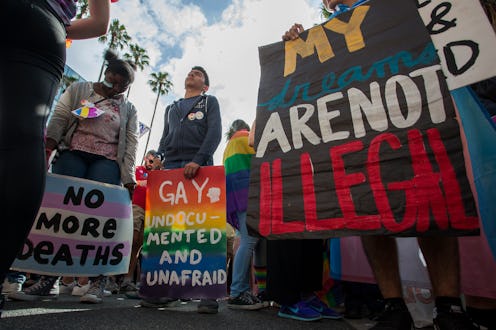News
Seeking Asylum In The US Traumatizes LGBTQ Folks & We Need To Change That

In this op-ed, Deborah Lolai and Courtney M. Lee, a current and former attorney for The Bronx Defenders, a public defender nonprofit for low-income people in New York City, explain how difficult it is for LGBTQ immigrants to seek asylum in the United States and what needs to be done about it.
While there’s celebration this Pride Month over how far LGBTQ rights have come, it has been a terrible year nationally for those most marginalized. The Trump administration has attacked health care access for trans folks, refused to protect queer youth, and comfortably rubbed shoulders with dictators who dehumanize LGBTQ people. Under this administration, one of the most urgent situations occurs at the deadly intersection between growing anti-immigrant sentiment and laws that are supposed to protect LGBTQ people who are seeking asylum from countries that persecute them for their sexuality.
There are over 15,000 LGBTQ people seeking asylum in the United States and an estimated 250,000 more unauthorized immigrants who self-identify as LGBTQ, according to the Williams Institute at the University of California, Los Angeles. They are among the most vulnerable and most likely to experience abuse, sexual assault, solitary confinement, and deficient medical care while detained. Transgender asylum seekers often suffer the most egregious harm, as illustrated by the deaths of Roxana Hernandez and Johana Medina León, trans women who died while in the government’s custody.
Our laws offer protections for individuals fleeing violence based on their sexual orientation or gender identity. But the harsh reality is that those protections are guarded by a process devoid of the very safety, dignity, and justice these individuals seek.
One of our clients at The Bronx Defenders, Jay (a pseudonym has been used to protect his identity), was kidnapped and tortured in Nigeria by an anti-gay “task force” after he openly expressed attraction to other men. After being severely injured and held in gruesome conditions by his captors for several days, he escaped and sought asylum in the United States. Yet, instead of finding the promise of freedom here, he was jailed upon arrival and held in confinement.
While Jay was detained, it was clear he needed specialized medical treatment for his injuries. He never received it. Shortly after his arrival, he again became the target of assault by others because of his sexual orientation. He was only released after six months because a federal lawsuit was filed on his behalf.
The process of seeking asylum for an LGBTQ person is inherently hostile.
Another of our clients, Daniela (a pseudonym has been used to protect her identity), a self-identified lesbian from the Dominican Republic, was forced to come out in order to prevent her deportation after she was arrested. In immigration court, an LGBTQ asylum seeker is required to prove that they are, in fact, part of the LGBTQ community or likely to be perceived as such if they are deported.
Daniela knew that her deeply religious family would never accept her sexual orientation. When her father found out, he threatened to kill her if she ever returned to the Dominican Republic. She sought asylum in the United States, and as part of her asylum claim, Daniela was forced to reveal her sexual identity to her mother, who was one of the witnesses in her case.
She had only two options: risk abandonment by her mother and family in the United States, or be deported to a place where she could be killed by her own father. Thankfully, she won the right to permanently stay in the United States. This coming out experience, however, opened long-repressed emotional wounds and continues to be a source of pain between her and her family.
The process of seeking asylum for an LGBTQ person is inherently hostile. Those who were never able to live openly in their countries of origin are often forcibly outed for the first time in immigration proceedings to government officials as well as their family and friends. This experience leads to serious psychological traumas, and because being forced to come out in the United States confirms their sexual orientation/gender identity, it ups the likelihood that someone in their country of origin will find out, thereby threatening their safety if they are deported.
Policy changes must be implemented across the immigration system to support LGBTQ asylum seekers. First, immigration officials, including judges and agents from the Department of Homeland Security, must undergo cultural competency trainings about the sexuality and gender spectrums to accurately adjudicate LGBTQ asylum cases. Second, city, state, and federal representatives must collaborate to institute policies that will keep clients safe while they are in deportation proceedings. Third, legal services providers must provide LGBTQ clients with holistic, culturally competent, and trauma-informed counseling throughout their immigration case. These reforms are necessary but certainly not exhaustive.
Experiencing further trauma, homophobia, transphobia, and biphobia should not be a part of the process to gain safety from persecution and discrimination. We demand justice for the most vulnerable among our LGBTQ clients and communities.
This article was originally published on